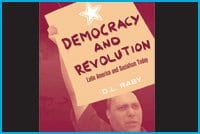Political alternatives have a certain ring to them. Sometimes we find solace in tearing down any hint of the status quo, at other moments we make room for “friendly” negotiations with our otherwise ideological enemies. In still other instances we engage in the kind of intense political work that is primarily driven by hope and even risk — hope for radical social change and the risk of our own privilege. We track it, observe it, make connections, talk strategies and even put our own bodies on the line. These strategies change, and need to change, for hope to keep moving and to keep moving us.
Diana L Raby’s 2006 book, Democracy and Revolution: Latin America and Socialism Today, is a timely examination of revolutionary politics in Latin America, specifically of Venezuela and Cuba. Raby’s observation that “the Left has been in crisis since the collapse of the Soviet Union” raises interesting questions about the productivity of this crisis and the surge of resistance movements.
Raby’s focus on Venezuela and Cuba relies primarily on how popular movements in these countries agitate locally as a way to change oppressive socioeconomic systems that are dependent on global capital. The “crisis” therefore has had a tremendous impact on how popular movements organize and mobilize for a different world.
“I was previously studying Cuba and was interested in why Cuba survived [despite US sanctions],” says Raby. She says she “started to go to Venezuela in solidarity” with Hugo Chávez’s socialist government. It made sense to combine her examination of both these places as a way to track the historical continuity of revolution but also to observe how revolutions change.
Raby’s critical observations are part of a familiar critique for queer politics because queers have had to organize and mobilize outside of official channels. Some of the most radical and participatory actions have been when queers have not relied on liberal parliamentarism. Local health initiatives that take into account public sex, are one example.
Raby calls this a necessary vehicle for change. The idea of participatory democracy, she argues, “is based on not just voting. It’s about people in communities being involved individually and collectively, at a regional and national level and this must be done on a continuous basis — these are intense types of political activity.”
What’s clear about this position is that it doesn’t designate or privilege one particular marginal identity in national politics and therefore what is initiated locally is significant for shifts in democratic participation.
“Any group in society should be recognized,” says Raby, “and participatory democracy means that LGBT communities should be actively involved for explicit government recognition.”
In Venezuela, as in other countries in Latin America, there has been some incorporation of queer groups into a national structure, which acknowledges sexual diversity. The group Movimiento Gay Revolucionario de Venezuela, among others, has worked with the Chávez government to reverse previous national policies. Discrimination on the basis of sexual orientation was outlawed in 1999 and official government representation has been part of Pride celebrations since Chávez came to power. While in North America this may seem like an insignificant step, being out and queer in most Latin American contexts is not generally acceptable. It can be extremely dangerous and in some cases illegal.
Raby recognizes that “other sectors and majority groups may not sympathize with LGBT groups and even within these diverse communities not all identify with Chávez.” Nevertheless she believes that conservative responses to queer communities require intense organizing. But improved legislation will not satisfy necessarily all equality rights issues — at least not right away. Some of these social changes can be accomplished via the media.
“Community media is an important force in Venezuela, especially community TV stations,” says Raby. “In the last four to five years many of these have been initiated by women and the Barrios of Caracas community TV stations have support.”
With a national channel that encourages cultural community programs with their slogan, “Don’t Watch Television, Make It,” there is the potential for community directed issues to enter the mainstream. Raby admits that queer participation is not as explicit but she also believes that nurturing community initiates makes it easier to include diverse perspectives.
What is flourishing in Venezuela, Raby points out with enthusiasm, is the great number of independent community media sources that are getting funding, necessary facilities and access to the airwaves. These openings for a critique of heterosexual privilege are not easily conceived and Raby says she’s aware that there may be a more assimilationist impulse among queers, but she adds that persistent political intervention does open up new sites of participation. In Bogota, Colombia, for example, recent municipal elections saw a candidate “for a ward in an area that had a strong presence of sex workers and trans folk — the candidate is also trans and proclaims publicly that he is also gay and active in organizing communities of sex workers. In another ward a candidate is openly lesbian.”
Yet queer identities are not necessarily tied to a critique of either heteronormativity or “the importance of building a global political alternative” and Raby reminds us that without a clear critique of class inequality and neoliberalism we are left with the same liberal structures and the same dogma of the old Left — both of which continue to exclude some queers while embracing others.

 Why you can trust Xtra
Why you can trust Xtra


